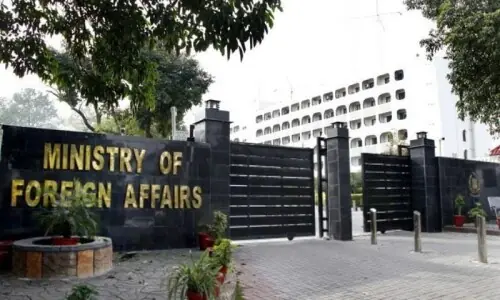THE Council of Islamic Ideology has recently drawn enormous attention for its reactionary statements on everything from women’s rights to the Panama Papers. If you had to guess when Pakistan was saddled with the CII, whose very title embodies the explicitly political role of religion in the state, you might think Gen Ziaul Haq’s time. You’d be dead wrong; it was the 1963 first amendment to the ‘secular’ Ayub Khan’s constitution. So just how did those changes come about, let alone survive his fall as well as Yahya Khan, Zulfikar Ali Bhutto and yes, Zia?
Today, you might associate Islamic ideology with maulvis and madressahs, but it wasn’t always so. The Objectives Resolution of 1949 which lodged it in the new state’s DNA was introduced by Liaquat Ali Khan, and championed by highly articulate, university-educated figures of standing in the Urdu intelligentsia’s right wing.
Perhaps intimidated by the scale of its ethnic and religious diversity (only exceeded by Indonesia), this circle feared that Pakistan, unlike other Muslim-majority countries, could not survive with ‘normal’ territorial nationalism. Instead, they called for an Islamic ideology, manufactured and policed by the state.
Ayub Khan came around to the rightist intellectuals’ views.
Of course, it took time to win the professionals over. The military, civil service and judiciary developed doubts over the politicians’ Islamic project after the mullah-led Punjab Disturbances of 1953. Despite this, less than a year after taking power, Ayub had come around to the rightist intellectuals’ views, and the army was not far behind its field marshal. With the president’s personal backing the Central Institute of Islamic Research was established in September 1959.
Then in February 1960, the committee (chaired by Gen Yahya Khan) overseeing the creation of Ayub’s new capital selected ‘Islamabad’ as its official name. By November, he came right out and declared the guiding principle behind this national rebranding exercise: “This [the Islamic ideology] is the foremost justification for our existence and we cannot be true to Pakistan without being true to this ideology.”
Let us pause to appreciate just how radical these words are. Pakistan was no longer its land, with its rich history, or its diverse peoples; it was reduced to whatever ideology the state propagated. That history and that diversity would have to be written out of the story, and if necessary disciplined into submission. Meanwhile, religion was impoverished, reduced to political ideology — a way of thinking that has far more in common with the divisive philosophy of Maududi and the Jamaat-i-Islami than the civic nationalism of Jinnah in August 1947.
You say, what about the Muslim Family Laws Ordinance? Didn’t it upset the ulema by raising the marriage age and limiting polygamy? Unfortunately, neither conflicts with the clergy nor their personal lifestyle made Ayub, Yahya or Bhutto secular. Many people — including ‘liberals’ — often need reminding that secularism is much more than a matter of lifestyle; it means defining political communities in a way that is inclusive of people of all backgrounds and faiths. This was certainly not the path that Pakistan found itself on under these regimes.
By 1966, Ayub Khan was jotting down in his diary that the real source of tension with East Pakistan was that it was too Hindu to be receptive to the Nazariya-i-Pakistan. This ideologically driven misdiagnosis of the province’s grievances was widely held in the military high command and played a major role in driving tensions to the breaking point in 1971.
The failure of Islamic ideology to hold Pakistan together should have given pause, but instead the establishment doubled down. Bhutto, in a March 1972 address, asked his people to “make this beautiful country an Islamic state, the biggest Islamic state, the bravest Islamic state and the most solid Islamic state”. Four years later in 1976, he proposed the introduction of Pakistan Studies into the school curricula to help achieve this, which Gen Zia’s government went on to make mandatory.
The Islamic parties deeply resented exclusion from a process initially dominated by intellectuals, civil servants and generals; over time, they have been granted increasing power to define national Islamic ideology by a deep state that needed support fighting endless wars at home and abroad.
Today, those parties ensure that this ideology remains embedded in the educational curriculum, poisoning young Pakistani minds against their fellow citizens. Musharraf’s attempts to institutionalise ‘enlightened moderation’ and reverse the process failed because the original project has been too successful. In a democratic age a confused and half-hearted establishment cannot simply order ordinary Pakistanis to reject the ideas they have been fed from birth without being accused of being sell-outs themselves.
This, above all, is why Pakistan’s educated classes must consciously embrace the transition from an ideological state to a territorial one if they are to ever break the power of the extremists that they now fear and hate.
The writer is a researcher and a doctoral candidate at the School of Oriental and African Studies, University of London.
Published in Dawn, June 9th, 2016































